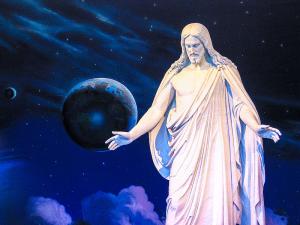Violent, sudden, and calamitous revolutions are the ones that accomplish the least. While they may succeed at radically reordering societies, they usually cannot transform cultures. They may excel at destroying the past, but they are generally impotent to create a future. The revolutions that genuinely alter human reality at the deepest levels—the only real revolutions, that is to say—are those that first convert minds and wills, that reshape the imagination and reorient desire, that overthrow tyrannies within the soul. — David Bentley Hart
The conversation about apologetics in Mormonism, which was rather animated for a time there, has died down again. Unfortunately, I don’t think that conversation yielded nearly as much fruit as it ought to have done, and some recent events in what I might call my personal life have convinced me that the question of apologetics is far more important than I’d recognized myself. I return to the question, then, perhaps without any ready audience. (I’ll note in advance that I’m limiting my discussion here to the Mormonism of The Church of Jesus Christ of Latter-day Saints, mostly because I’m just not knowledgeable enough about other Mormonisms to say anything not obviously ignorant about their situations.)
Mormonism, at least as it exists in the United States, can’t escape the fact that it needs to be explained—or even defended. There is still too much ignorance, too many misconceptions, too many misrepresentations, too much unwarranted prejudice (this last mixed with a fair bit of warranted prejudice, perhaps). All seem to recognize that, and this situation calls for a certain apologetic response. However much most folks in Mormon studies express disdain for what’s now being called “traditional apologetics,” there’s no mistaking that some form of apologetics is at work in most everything students of Mormonism have to say. And that’s something most are willing to admit, at least in candid moments. But that’s not the sort of apologetics I want to talk about. At least not yet. I’m interested here in something more emphatically defensive—perhaps even polemical. I’m interested here in the status and stakes of what too many seem ready to dismiss with a wave of the hand and the application of the label “traditional.” The word is meant to suggest a certain no-longer-necessary orientation to Mormonism’s enemies, a certain defensiveness born out of the now-inappropriate feeling that something more than tolerance or respect or even academic interest is worth fighting for. I don’t think there’s any denying that the terrain has changed in many ways. At the same time, I think there’s something decidedly one-sided about such hand-waving.
The fact is that the Mormon situation is heavily determined—over-determined, perhaps—by apologetic concerns. It’s not just that there are misunderstandings or even outright misrepresentations from without that need responding to. It’s also, and perhaps more importantly, that there’s a certain irrepressible demand from within that certain claims or positions be defended. It’s not enough, then, to say that the terrain has changed outside the Church, and so that apologetics is no longer needful; there’s something inside the Church that still makes apologetics crucial. This something might be understood in epistemic terms. Among the assumed criteria of justified true belief for most Latter-day Saints is a certain intellectual defendability. That, I think, is just a fact. The “-ability” of “defendability” is important here. It’s not that any one person actually has to defend Mormonism’s faith claims, but just that it must be possible for those faith claims to be defended. A kind of outsourcing results: there’s presumed to be, at any given moment, a group of inspired leaders and/or well-trained scholars out there who know the answers to difficult questions—and the sheer existence of those leaders and/or scholars (even if one doesn’t know their names) is enough to satisfy the criterion of intellectual defendability for most Latter-day Saints most of the time. But reminders of the existence of such leaders and/or scholars are extremely comforting to Latter-day Saints, and giving such reminders serves at the practical level as a way of marking one’s own trustworthiness. (One can raise all kinds of thorny questions in a Sunday School classroom so long as one has first made clear one’s awareness of and commitment to the answers that can be given to criticisms of the Church.)
There’s thus, I think, a deeply felt need for at least the presumed existence of an apologetic program within Mormonism. And making clear one’s own commitment to that existence is itself a matter of a certain orthopraxy. I don’t know that there’s any way around the apologetic imperative in Mormonism without a major epistemological transformation. The very nature of what we (unreflectively) regard as epistemic justification would have to change for apologetics in a strong sense simply to become irrelevant or unneeded. Apologetics is necessary to the life of the Church, at least for the foreseeable future. So what can we say about the shape apologetics ought to take?
The crisis into which Mormon apologetics has fallen in the past few years has been, I think, profoundly misunderstood in the Mormon academic community. (Let there be no mistake that there has been such a crisis. The fact that apologists have spent as much time as they have defending the apologetic enterprise and raising worries about non-apologetic forms of Mormon studies is evidence enough of a crisis.) The usual interpretation of the crisis is something like the following: “Apologetics (at least of a certain sort) has become more or less unnecessary. We’re no long an embattled minority, and there are scholars and laypersons interested in Mormonism for innocent—if not noble!—reasons. The task at present isn’t to defend, but simply to explain, or, more complexly, to begin to see the richness of Mormon history, beliefs, practices, and so on.” There’s some truth there, I think, but it’s greatly muddled, and it misses everything most essential. The crisis isn’t at all about changes external to the Church.
What has apologetics been for the past several decades, during the height of its influence and—if it isn’t inappropriate to use this word—its power? Beginning in the early 1980s, apologetics has been first and foremost an effort to argue about what does and doesn’t exist, an effort to establish the actual presence in the world at determinate times of certain entities. That might sound a bit abstract, but all I’ve got in mind is the fact that apologists have dedicated themselves to defending things like the historicity of the Book of Mormon, where that historicity is taken to entail the existence in ancient America of certain peoples and events (Nephites, Lamanites, and all their doings), or the presence in nineteenth-century America of certain objects and encounters (gold plates, angelic visits, and the like). It’s too often said that such apologetic activity aimed at proof, but that’s not quite right—as apologists themselves are quick to point out. Apologetic demonstrations have followed the classically scientific model of confirmation by observation: “If the Book of Mormon is true (i.e., historical), the bare possibility of a certain determinate set of things happening in the ancient world should be showable, and the bare possibility of another determinate set of things happening in the nineteenth century should be showable. Such bare possibility can be shown. Therefore, it’s not unlikely—with every demonstration it’s more likely—that the hypothesis (namely, that the Book of Mormon is historical) is true.” That’s good logic, inductive though it might be, aimed at establishing probability rather than definite truth. Of course, there’s a certain sleight of hand—a brilliant sleight of hand, frankly—at work in this gesture. Because the hypothesis is a claim about actuality that is taken to entail claims about possibility (if the Book of Mormon is historical, the events it describes must be possible), the mere demonstration of possibility (undertaken as a kind of battle against impossibility) serves to lend greater and greater credence to actuality. That’s a bit strange, but it’s brilliant.
It’s brilliant, yes, but I think its time has passed. And in certain ways, it never should have happened in the first place. Its time has passed in that readers of apologetics have largely become suspicious. I don’t think too many readers have quite sorted out what bothers them about the apologetic gesture, but they’re bothered. Frankly, it’s entirely possible—likely even—that many of the apologists’ critics are more than a little obscenely self-satisfied, a little too sure about their own understanding, whether of the ancient world or of nineteenth-century history. And it’s not hard to see that a fair number of them begin from a commitment to pluralism that’s not without its own problems, and that it’s that that makes them skeptical about the entire apologetic enterprise. Such shortcomings on the part of the critics are lamentable, but they’re hardly to be overcome through the presentation of still more of the sort of apologetic work that’s been done. As I say, the time of that sort of apologetics has passed. But as I also say, in certain ways, that sort of apologetics never should have happened in the first place. That’s my more audacious claim, and it’s one that needs defending. What I want to suggest is that there’s a very serious problem with the project of arguing about what does and doesn’t exist, about attempting to establish the actual presence in the world at determinate times of certain entities—as I put it above. The problem is that Mormonism itself is misunderstood if it’s taken to imply simply that certain things exist or have existed, or that certain things take or have taken place. Mormonism is a great deal more audacious than that. It claims not (only) that certain things have existed or happened, but also and more importantly that we’ve entirely misunderstood the very order of things. That’s the point that needs defending.
Let me see if I can’t say this as simply and clearly as possible: The task of apologetics isn’t to establish the possibility (and therefore ever-increased probability of the actuality) of certain undemonstrable claims about the things that populate the universe; the task of apologetics is to make clearer and clearer that what’s to be defended calls for a radically transformed understanding of how the universe organizes itself. It’s not about what’s in the world, but about what the world is, that’s at stake. The danger, then, at work in so-called “traditional” Mormon apologetics is that it strains at gnats and swallows camels, conceding the basic framing of the world assumed in modernism and secularism while contesting just whether certain persons or events should be regarded as among the persons and events making up history. The cosmic war has been abandoned in order to focus all efforts on just a few battles—or perhaps a few mere skirmishes. To put it a bit provocatively: it’s too easy to demonstrate the possibility (and therefore, perhaps, the probability) that Lehi’s family as portrayed in First Nephi traveled through ancient Arabia; it’s much, much more difficult to clarify why the story that’s told in First Nephi radically contests all of our deepest convictions and presuppositions about the world. And that’s what deserves the most rigorous efforts of Latter-day Saints. A certain apologetic effort is necessary, but one dedicated less to quibbling over the existence of steel in the ancient world than to demonstrating the force of what the Book of Mormon claims about the nature of history. We’re ready—far too ready—to secure the historicity of the Book of Mormon in such a way that the world will remain more or less as it is, when our task is to get clear about and then to make as public as possible how the Book of Mormon questions our very conception of history. If we secure the historicity of the Book of Mormon entirely within the terms of a conception of history that the book itself contests, we’ll have gained the whole world but lost our souls.
Now, to be clear, apologetics as it’s been done for the past several decades isn’t entirely averse to the sort of thing I’m trying to talk about here. Indeed, the most charitable reading is to assume that a strategy like the following has been behind the world of the apologists: If we can just get people to take the Book of Mormon seriously enough on their own (fundamentally secular) grounds, then they’ll read it seriously and therefore begin to see its message concerning the nature of the world. If that’s the strategy, I’ll confess that I’m sympathetic, but I’m also deeply skeptical that such a strategy could work. Because the “traditional” apologetic approach is to establish probability, its work will never come to an end, and I suspect we’ll merely have postponed the task of getting the Book of Mormon’s message out into the open indefinitely.
The crisis into which Mormon apologetics has fallen should thus be understood in a radically different way than we’ve understood it. It’s not just that it’s not being regarded charitably enough, nor is it just that a younger generation of secular sell-outs have given up on demonstrating the truth of Mormonism. Those things are probably true, but they’re small potatoes. It’s much more crucial to see that a kind of general sense of the inadequacy of a certain approach to apologetics has developed. It’s come to be recognized that what apologetics has for far too long taken to be the “truth” of Mormonism isn’t nearly robust enough. It’s come to be recognized that what apologetics has defended as its insistence on transcendence and the supernatural remains just as trapped within the secular as any other intellectual program. It’s come to be recognized that the apologists, for all their study of history and scripture, aren’t giving us to see the real richness and force of what’s on offer in history and scripture. Now note: This isn’t to claim that “richness is the new proof”; frankly, it’s to claim just that there’s something anemic about the Mormonism that “traditional” apologetics has attempted to outline. The sort of Mormonism that can be defended on entirely secular grounds (even if what’s thereby established as possible might harbor within itself something extra-secular) is a Mormonism that just doesn’t say much. If the Book of Mormon only gives us a secularly traceable history of the ancient Americas (derivatively lending credence to Joseph Smith as a prophet); if the Book of Abraham only gives us a secularly correct interpretation of a few Egyptian documents (derivatively lending credence to Joseph Smith’s wildly speculative Nauvoo theology); if the history of the Church only gives us a secularly defensible picture of institutional doings (derivatively lending credence to the idea that God could support such an institution)—if that’s all we’re to get from the things that need defending in Mormonism, I’m not sure what we’re fighting for. What if the Book of Mormon also outlines a radical revision of Christianity in light of ancient covenants? What if the Book of Abraham also contests the rigidity of our interpretations of biblical texts by giving license to speculative theology? What if the history of the Church also gives us to understand the constant struggle of God with incredibly fallible human beings? I suspect that these sorts of things are the whole point, and one we’ve too often entirely overlooked.
Jim Faulconer often asks why we insist on letting the devil have all the good words. Latter-day Saints would do well not to let the devil have this word: apologetics. When it’s done well, it serves as a radical gesture, a bit of militant revolutionary work. Latter-day Saints, if they’re to believe their founding prophet, are invested and involved in a revolution. Joseph Smith claimed to lay a foundation that would revolutionize the world. Apologetics must become a tool in that work of revolution, if it’s to survive.
And I hope it does survive.











